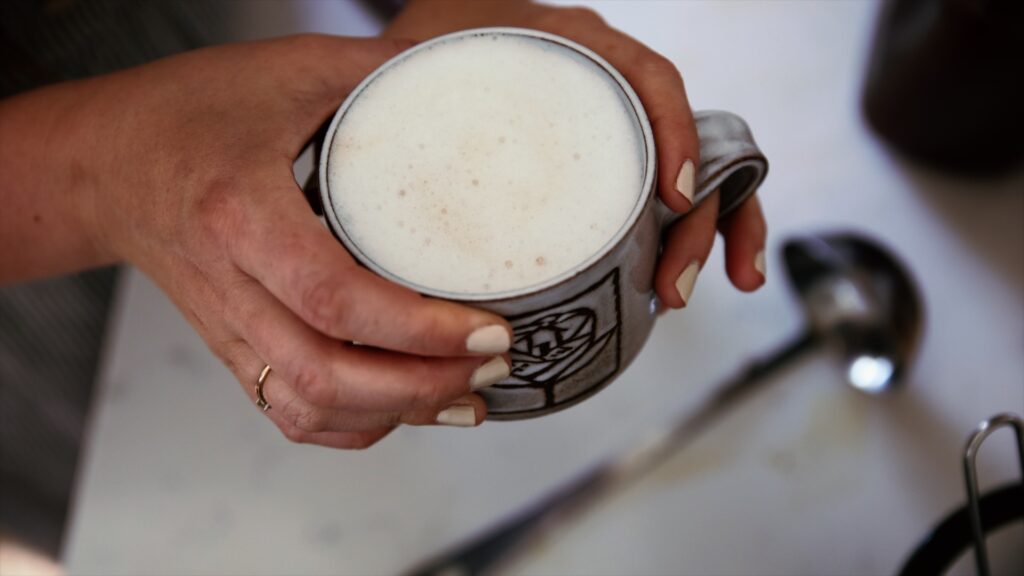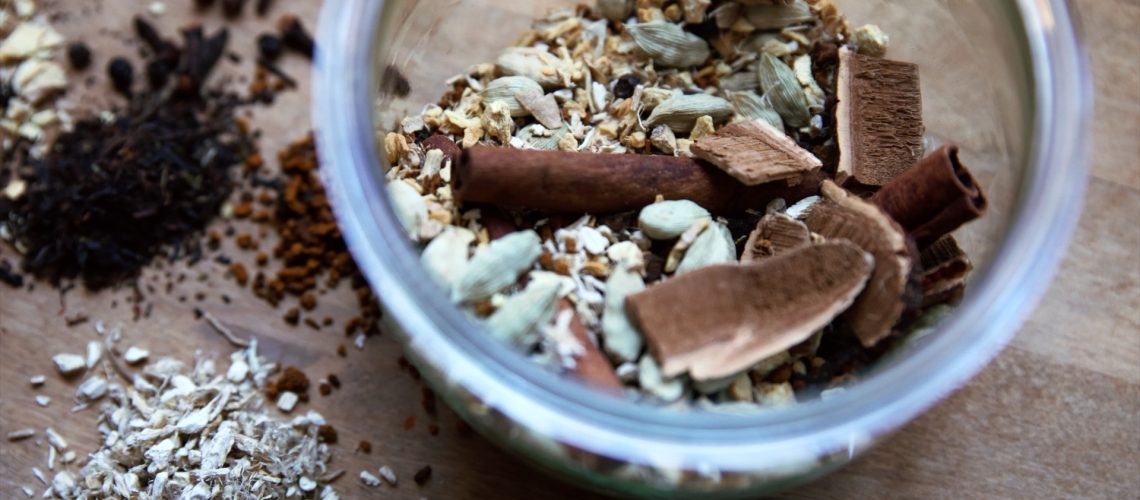Learn to make flavorful, delicious Adaptogen Mushroom Chai with amazing medicinal properties in this simple recipe.
I don’t know about you, but I really love coffee.
Being sensitive to caffeine, I learned to really savor my one cup of half-caff coffee every morning. I had a whole coffee routine down, using locally roasted beans and a scientific method of crafting my daily americano. You never could have convinced me that I’d be switching to tea for my morning caffeine boost, but here we are!
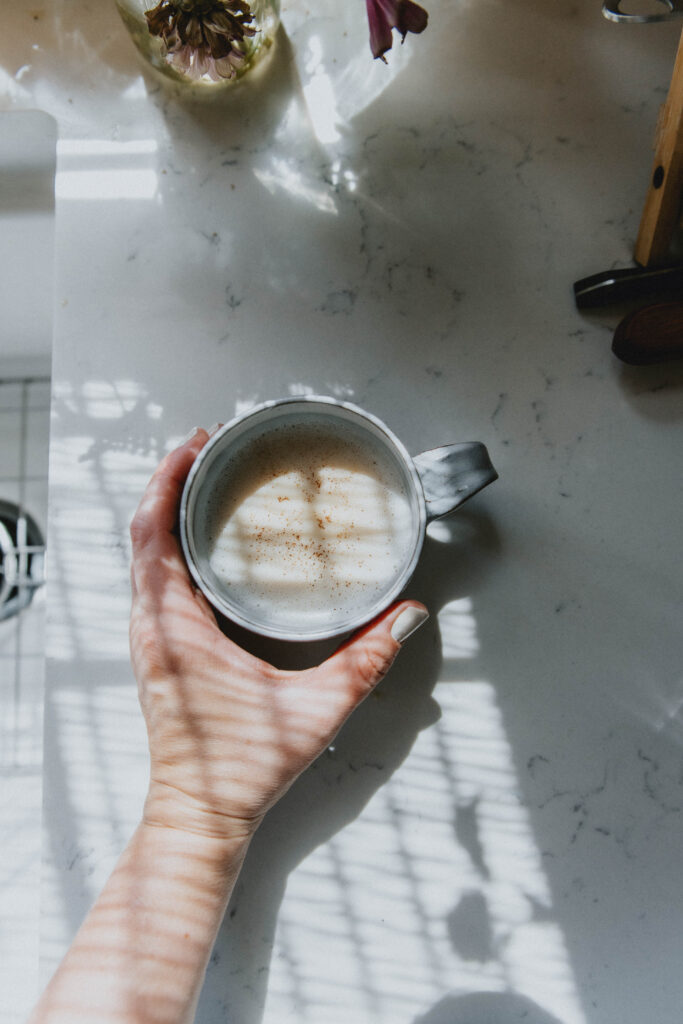
The Story
A few months ago I began to have some problems with regular heartburn, and one of the things my naturopath recommended was to cut coffee and see whether it helped. Much to my disappointment, cutting coffee significantly helped. I needed to find a new morning boost. Enter mushroom coffee alternatives!
The Struggle
Maybe you’ve seen the fancy advertisements for a variety of mushroom-coffee alternatives out there. They usually have a whole host of mushroom and adaptogenic ingredients to boost your mood and energy, and help you focus too. Sounds great, right? I tried a few and found that they were very expensive and honestly not very tasty. They left a thick sediment at the bottom of my mug, and the flavor just wasn’t worth the price tag.
The Solution
I am a DIY girl at heart, so this seemed like the chance to create my own mushroom coffee-alternative. I was certain I could come up with something tastier and at a fraction of the cost of the blends I had tried.
Most of the coffee alternatives I tried were more of a Mushroom Chai than a coffee-tasting blend. I found I really enjoyed the rich spice of Chai mixed with the earthy taste of mushrooms. I also liked the option of adding black tea for a caffeine boost too.
The Deets
Chai is simple enough to make, and I loved the idea of creating a concentrated tea much like this one from my friend Kate over at Venison For Dinner.
With a concentrate, you can make a big batch and use it over the course of a week or so with very little day-to-day effort. If you’re looking for instructions for canning your chai concentrate be sure to check Kate’s recipe out.
I settled on a couple varieties of dried mushrooms that I really enjoy in this blend. You can absolutely adjust the ingredients to suit your own tastes and needs. More spice? Adjust the ginger and pepper. Prefer different mushrooms? No big deal.
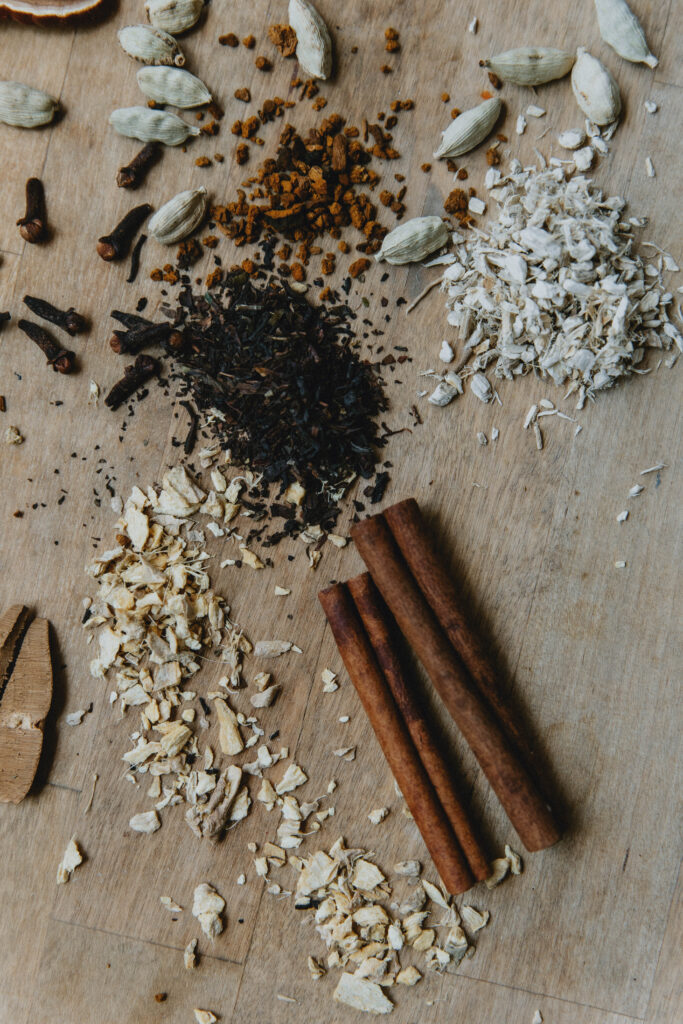
Why Mix Mushrooms With Chai?
Not only do mushrooms bring an earthy, umami sort of taste to Chai, but they are also a powerhouse of nutrients and contain many medicinal qualities which are best accessed when consuming them in a tea.
Medicinal mushrooms (different than their psychedelic cousins) are believed to improve cognitive function and memory, as well as provide an energy and immune system boost. Many are anti-inflammatory and contain antioxidant properties, and some mushrooms, like Reishi, are adaptogenic too.
What is an Adaptogen?
An adaptogen is a natural substance, like an herb or mushroom, which helps the body adapt to stress. Adaptogenic plants and fungi restore balance to the body, and often provide other harmonious benefits too, such as antioxidant and anti-inflammatory support.
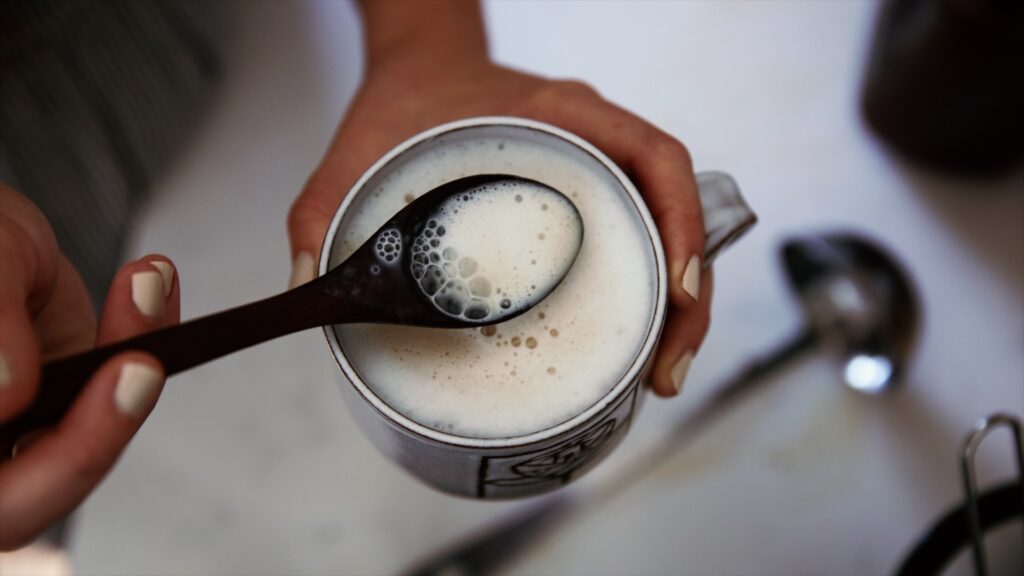
What Spices are in Mushroom Chai?
Mushroom Chai is not only tasty, it’s beneficial for digestion and a healthy immune system too. I wanted to create a coffee-alternative that was especially gut-soothing, so I added a few extra ingredients to my Mushroom Chai to make it easy on my stomach, and good for my health too.
I sourced my ingredients from Mountain Rose Herbs and have linked them below. But you can purchase the spices and mushrooms locally or from your favorite online herb store too.
My Adaptogen Mushroom Chai Recipe Includes:
Cardamom: This is what gives Chai its signature rich flavor and spice! It also has antioxidant and anti-inflammatory properties.
Ginger: Another important part of that classic chai spice. Ginger also has antioxidant properties and promotes digestion.
Cinnamon: This classic spice makes just about anything taste better, doesn’t it? Cinnamon also is full of polyphenols and is a powerful anti-inflammatory agent and some studies show it to be antiviral as well.
Black Pepper: The king of all spices, black pepper adds zing and spiciness to Chai. It also is a powerful antioxidant and – you guessed it – it’s anti-inflammatory too!
Cloves: More of that robust spicy flavor for our Chai! Cloves are high in antioxidants too, and also boast an especially high amount of manganese.
Chaga Mushrooms: This fungi has a pleasant, earthy taste and adds depth to the chai tea. It also packs a serious antioxidant and anti-inflammatory punch, and contains cancer-fighting properties too.
Reishi Mushrooms: These mushrooms are bitter in taste, so you don’t want to overdo it. The good thing is that the bitter taste is also beneficial for digestion. Reishi also is a powerful adaptogen, helping your body respond to stress. It also supports the liver, boosts the immune system, and promotes mental clarity.
Marshmallow Root: Marshmallow isn’t ordinarily included in Chai, but is known for its soothing healing properties, especially for ulcers and leaky gut. It has a slightly sweet and earthy taste, but is very mild and doesn’t add much by way of flavor to the chai.
Salt: Like most foods and drinks, Chai tastes better with a little salt. Use a mineral-rich salt like Redmond to add a mineral boost to your cuppa.
Black Tea: Adds the caffeine and depth of flavor and tannins that round out a good chai. I use 1/2 cup because I don’t need a huge caffeine kick. You could add more, leave it out, or swap for roobis if you don’t want the caffeine. Black tea also comes with its own set of health benefits though, including high amounts of polyphenols and flavonoids. These are antioxidants which can also enhance gut health, promote heart health, and help balance blood sugar levels.
Sucanat: You can sweeten your chai with any sugar or sweetener you like. I prefer sucanat (sometimes called “rapadura”) because it is a great unrefined sweetener option. It is simply dehydrated cane juice. It’s mineral-rich and tasty, and I like the depth of flavor it gives my chai. You could sub maple syrup instead for a similar flavor and mineral-content.
How To Get The Most Health Benefits From Mushroom Chai
Medicinal mushrooms, as well as many of the other spices in Chai, benefit from a long simmering time. This is commonly known as a “decoction,” and it allows the full benefits of the fungi and spices to be extracted into the tea. I prefer to let my Mushroom Chai simmer for at least an hour to get the best bang for my buck.
Often I make my Adaptogen Mushroom Chai on the stovetop in a dutch oven. Another method I use frequently is bringing the water and spices to a boil, and then allowing them to simmer in the crockpot on low overnight.
How Do You Make Mushroom Chai?
You can get really fancy with which herbs and spices go into the pot at different points, but I like to keep things simple. I put all the ingredients except the black tea, sugar/sucanat, and salt into the pot and bring it to a boil, then allow it to simmer for upwards of an hour. Once the decoction is finished, I stir in the black tea, sucanat, and salt. Then I allow the tea to steep for about 5 minutes and make sure the sugar is dissolved before straining the Chai.
I keep my Mushroom Chai in the fridge and use throughout the week. I like to enjoy it as an iced Chai latte with goat milk, but it’s equally delicious hot with a bit of cream or milk and foam. The Chai will stay fresh in the fridge for about 10 days.
Adaptogen Mushroom Chai
Ingredients
- 4 Cinnamon Sticks Approximately 3" sticks
- 1/4 cup Cardamom whole, green pods
- 1/4 cup Dried Tea-Cut Ginger
- 1 tsp Black Peppercorns
- 1 tsp Whole Cloves
- 1/4 cup Dried Chaga Mushroom Granules
- 3 to 4 slices Dried Reishi
- 1/4 cup Marshmallow Root
- 1/4 cup Looseleaf Black Tea Assam is the most commonly used variety for Chai
- 1 cup Sucanat Can sub maple syrup or other favorite sweetener
- 1 tsp Salt
- 1 gallon Filtered Water
Instructions
- In a large pot or crockpot, add all of the spice and mushroom ingredients (reserve the tea, sugar, and salt) and 1 gallon of water.
- Bring the pot to a low boil, and then cover and allow to simmer for at least 1 hour. If making the Chai in a crockpot, bring to a boil and then let the Chai steep on low heat overnight.
- After the Chai has simmered and grown fragrant and strong, stir in the black tea, sucanat/sugar, and salt.
- Allow the tea to steep for 5 minutes, then strain the Chai into a jar.
- Make Mushroom Chai lattes with frothed milk, serve over ice with milk or cream, or enjoy it however else you like! This is a concentrate, so you'll want to dilute it to your taste preferences.
- Store the Chai in the fridge for about 10 days, or else freeze or can the concentrate to save it for a rainy day.
Alternative Suggestions
If you want to add some individuality to your cup of Mushroom Chai, try adding or swapping some of the ingredients. Here are a few suggestions.
- Turmeric
- Cordecyps Mushrooms
- Lion’s Mane Mushrooms
- Turkey Tail Mushrooms
- Cocoa Nibs
- Allspice
- Nutmeg
So now you know all there is to get started brewing your very own fancy mushroom coffee alternative. Adaptogen Mushroom Chai tastes amazing and helps you stay healthy too. And all for a fraction of the cost of some of those specialty mushroom coffee blends out there.
If you tried this recipe and enjoyed it, I’d love to hear! Leave a comment below and tell me how you like to enjoy your Adaptogen Mushroom Chai.
